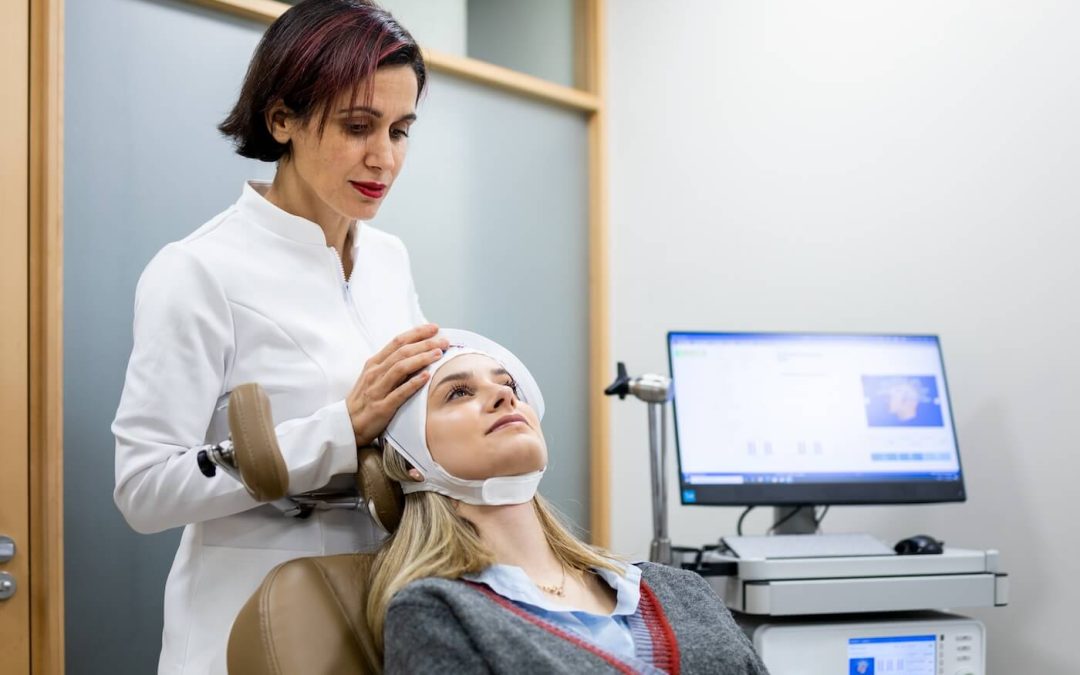Regain Control with TMS Therapy at OptiMindHealth
What Is TMS Therapy?
TMS Therapy is a non-invasive, drug-free treatment that uses gentle magnetic pulses to stimulate targeted regions of the brain associated with mood regulation. Unlike medication, which affects the entire body, TMS delivers focused therapy directly to underactive brain areas without systemic side effects.
OptiMindHealth’s TMS Therapy is:
- FDA-approved for treatment-resistant depression
- Safe and non-invasive, with no need for anesthesia
- Highly effective, with noticeable improvements in mood, focus, and energy
- Covered by most major insurance providers
Who Can Benefit from TMS?
TMS therapy is an excellent option for individuals who have not experienced relief from two or more antidepressant medications and are seeking a non-medication, non-surgical approach to mental health treatment. It is especially well-suited for those who prefer a solution with minimal side effects but meaningful, lasting results.
TMS has been shown to help individuals struggling with a range of conditions, including Major Depressive Disorder (MDD), anxiety disorders, Obsessive-Compulsive Disorder (OCD), Post-Traumatic Stress Disorder (PTSD), bipolar depression, and even chronic pain or migraines. For many, it offers a renewed path to healing when traditional treatments have fallen short.
At OptiMindHealth, we tailor your care to your diagnosis, lifestyle, and goals, ensuring that TMS fits seamlessly into your healing journey.
What to Expect During TMS Treatment
TMS therapy is a quick, non-invasive, and comfortable procedure that integrates easily into most patients’ daily routines. Designed to be stress-free and efficient, each session allows you to relax in a quiet environment while receiving targeted, evidence-based care. There’s no need for sedation, and most people are surprised by how manageable and straightforward the process is. Whether you’re heading to work afterward or continuing your daily errands, TMS won’t slow you down.
Here’s what a typical session looks like:
- Get Comfortable: You’ll be seated in a comfortable chair in a peaceful setting. No anesthesia or sedation is required, and you’ll be fully awake and relaxed throughout the procedure.
- Precise Brain Mapping: During your first visit, the clinician will locate the specific region of your brain that will benefit from stimulation. This mapping ensures that the magnetic pulses are delivered to the right area for maximum effectiveness. Once established, this mapping typically remains consistent for future sessions.
- Therapy Begins: A magnetic coil is gently placed against your scalp. The coil emits repetitive magnetic pulses, which feel like light tapping or clicking sensations. These pulses activate underactive nerve cells linked to mood regulation and other mental health functions.
- Back to Your Day: After the session, you can immediately resume normal activities with no downtime or recovery period. Many patients return to work, run errands, or continue with their day as usual.
Most patients undergo TMS five days a week for four to six weeks, with each session lasting about 30 minutes. As treatment progresses, individuals often begin noticing improvements in mood, focus, and overall well-being.
Why Choose OptiMindHealth?
At OptiMindHealth, we go beyond standard treatment. Our expert clinicians provide:
- Personalized care plans tailored to your mental health history and daily life
- Cutting-edge equipment and evidence-based techniques
- Compassionate support every step of the way
Whether you’ve struggled with treatment-resistant depression or are exploring new options for anxiety, OCD, or PTSD, our team of board-certified psychiatrists and licensed mental health providers is ready to guide you toward recovery.
Proven Results with TMS
- 50–60% of patients with treatment-resistant depression report significant symptom reduction
- 1 in 3 patients achieve complete remission
- Many experience improved sleep, sharper focus, and a better overall quality of life
- Benefits often continue long after treatment ends
Get Started With OptiMindHealth Today
Don’t let mental health challenges keep you from living your best life. If you’re ready to explore a safe, effective, and modern approach to treatment, TMS might be the answer you’ve been searching for.
Contact OptiMindHealth today to schedule your consultation and find out if TMS is right for you.
Contact Us Today
If you have questions about our services, contact us by completing the form below. We will get you to the right team to help and will reach back out to you within the next business day. Please note that completing this form does not guarantee acceptance as a patient of OptiMindHealth, nor does it establish a provider-patient relationship. Any information provided on our website or in our responses cannot be considered medical advice or treatment. If you are experiencing a medical emergency or life-threatening situation, do not use this form; instead, call 9-1-1 for emergency assistance and follow up with your primary care provider.
Frequently Asked Questions (FAQs)
Is TMS therapy safe?
Yes. TMS is FDA-approved and considered very safe. Most patients experience only mild side effects like scalp discomfort or headaches, which typically subside quickly. Serious risks, such as seizures, are extremely rare (less than 0.1% incidence).
How many sessions will I need?
Most treatment plans involve five sessions per week for 4 to 6 weeks, depending on your diagnosis and how you respond to therapy. Your provider at OptiMindHealth will tailor the schedule to your specific needs.
Who is a good candidate for TMS?
TMS is ideal for individuals with treatment-resistant depression, such as those who haven’t responded to at least two antidepressants. It’s also an option for people with anxiety, OCD, PTSD, or migraines, especially if they prefer a non-drug alternative.
Recent Posts

What is TMS?
As more Americans turn to medication for mental health care, it’s becoming clear that traditional treatments don’t work for everyone. This fact is prompting a growing interest in new and innovative therapies. One such breakthrough is Transcranial Magnetic Stimulation,...

The COVID-19 Crisis and Getting Help
The coronavirus (COVID-19) crisis is unprecedented, and affects not only our physical health and daily lives, but also our mental health. The first case of COVID-19 was discovered in China's Wuhan city, and has since been spreading worldwide. The severity of the...

Group Therapy Can Help
Group therapy is counseling for a small group of people struggling with similar concerns. It is often a rewarding experience, and suitable for many people. As such, it can help those struggling with social isolation, depression, and the effects of trauma. In some...

Dialectical Behavior Therapy
DBT is a type of counseling that helps us learn how to seize the moment, cope more easily with stress, improve relationships, and regulate emotions. So, it is helpful for many of us create more stability in our lives. It was at first intended for those with borderline...




